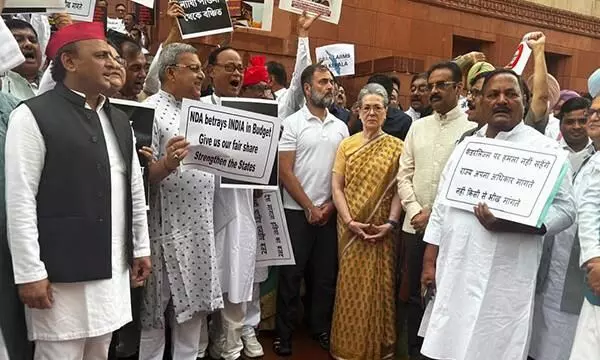
Opposition calls Budget a political manoeuvre to placate coalition partners
text_fieldsOpposition parties in both houses of parliament criticized the BJP-led government, accusing it of fostering regional disparity and undermining federal principles by favouring Bihar and Andhra Pradesh in the latest Union budget.
The controversy erupted a day after the budget was presented, with the opposition labelling it as a “kursi bachao” budget, prioritizing political allies over equitable distribution of resources.
Key opposition figures argued that the budget disproportionately benefits states aligned with the BJP, specifically targeting Bihar and Andhra Pradesh. Nitish Kumar's JD(U) in Bihar and Chandrababu Naidu's TDP in Andhra Pradesh, both crucial NDA allies with significant parliamentary representation, were highlighted as primary beneficiaries. This alleged favouritism, opposition leaders claimed, undermines the federal structure by rewarding states that support the BJP while neglecting others.
In a speech in the Rajya Sabha, Congress MP P. Chidambaram condemned the budget as the "death knell of federalism," criticizing the government for selective allocation of funds and accusing it of penalizing states with non-BJP governments. He cited instances where states like Kerala, West Bengal, and Tamil Nadu faced reduced borrowing limits and denial of disaster relief, questioning the government's motives and fairness in resource distribution.
Finance Minister Nirmala Sitharaman defended the budget, stating that it is impractical to mention every state in the budget speech and dismiss accusations of bias. However, opposition leaders in the Lok Sabha continued their attack, describing the budget as anti-people and a political manoeuvre to placate coalition partners.
TMC's Abhishek Banerjee criticized the budget for lacking clarity and vision, asserting that it was designed to benefit political allies rather than address the needs of the general populace. He challenged the finance minister to release a detailed account of funds allocated to West Bengal, accusing the central government of withholding resources following the BJP's electoral defeat in the state.
DMK MP Dayanidhi Maran echoed these sentiments, accusing Prime Minister Narendra Modi of failing to deliver on pre-election promises and favouring states that supported the BJP. He called for the Prime Minister to adopt a more inclusive approach, similar to Tamil Nadu Chief Minister M.K. Stalin, who committed to serving all citizens regardless of their political affiliations.
NCP's Supriya Sule highlighted the absence of Maharashtra’s finance minister from GST council meetings, arguing that this exclusion deprives the state of vital financial discussions and decisions. She urged the BJP-led government to avoid treating states differently based on electoral outcomes and emphasized the need for a fair and balanced approach.
In contrast, BJP allies JD(U) and TDP defended the budget. JD(U) MP Dinesh Chandra Yadav welcomed the allocation of funds to Bihar, asserting that the state’s long-standing demands for special category status justified the financial support. He criticized the opposition for objecting to the budget, arguing that backward states like Bihar deserve attention and resources to address their developmental needs.
TDP MP Bharat Mathukumilli expressed gratitude for the Rs 15,000 crore allocated for the development of Andhra Pradesh’s capital, Amaravati, and other infrastructure projects. He emphasized the importance of continued central support to help Andhra Pradesh recover and thrive, advocating for cooperative federalism where strong states contribute to a robust nation.

















